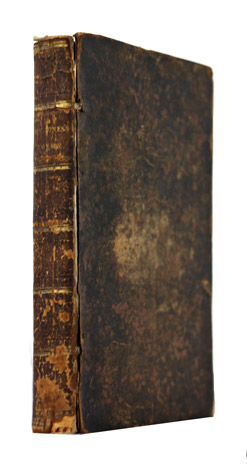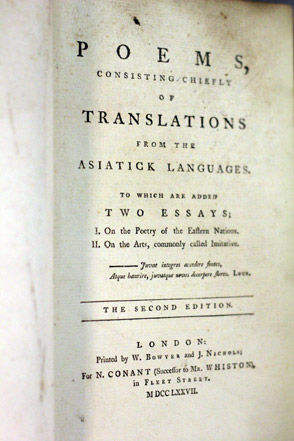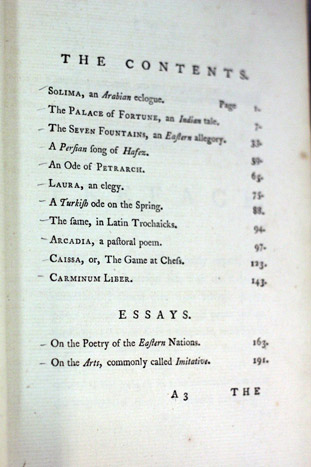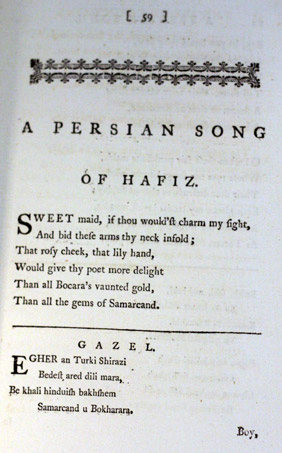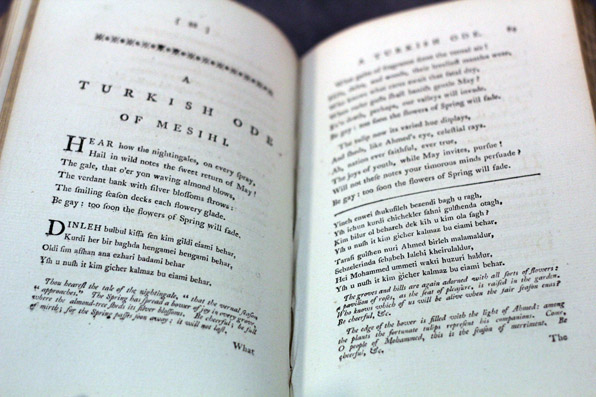Title: Poems, Consisting Chiefly of Translations from the Asiatick Tongues
Author: Sir William Jones (trans)
Publisher: Printed by W Bowyer & J Nichols, for N Conant, London, Fleet Street, 1777. Second edition. Exceptionally rare.
Condition: Hardcover, full leather. Beat up, front board hanging by 2 threads, back board tender, severe wear and rubbing all over. Missing blank (?) flypage and half-title with dedication. The rest of the text is complete and firmly bound, in excellent condition.
The first edition of 1772 contains probably the first translations, in fragments, of Persian poets Hafiz and Sa’di and Ottoman poet Mesihi into English (this is the second edition). Also contains influential essays on “oriental” (Arabic, Persian, Turkish and India) poetry – introducing it to the English-speaking world – as well as beautiful descriptions of Yemen and its people and poetry.
Of tremendous historical importance – see below. Jones is commonly acknowledged to have started the study of comparative linguistics and Indo-European languages under a single umbrella.
Contents:
SOLIMA, an Arabian eclogue.
The PALACE OF FORTUNE, an Indian tale.
The SEVEN FOUNTAINS, an Eastern allegory.
A Persian song of Hafez.
An Ode of PETRARCH.
LAURA, an elegy.
A Turkish ode on the spring.
ARCADIA, a pastoral poem.
CAISSA, or, The Game of Chess.
E S S A Y S.
On the Poetry of the Eastern nations.
On the Arts, commonly called Imitative.
About the book (from an essay by Rudolf Beck):
Sir William Jones’s Poems, Consisting Chiefly of Translations from the Asiatick Tongues is the early work of an author who is otherwise known as a pioneer in oriental studies, in fields as diverse as liguistics, literature, history, archaeology, natural history, and the law.
The volume contains two important essays by Jones, “On the Poetry of the Eastern Nations” and “On the Arts, Commonly Called Imitative,” and a number of poems. Five of these are original poems by Jones. With the exception of two juvenilia – “Arcadia, a Pastoral Poem” and “Caissa, Or, The Game of Chess” – their subject-matter is recognizably “oriental.” Besides, there are translations: a Turkish Ode by the Ottoman poet Mesihi, and “A Persian Song of Hafiz,” which was later to become popular with the Romantic poets and to inspire Goethe’s West-Östlicher Divan, and was even reprinted in The Oxford Book of Eighteenth Century English Verse of 1926. Interestingly, “A Persian Song of Hafiz” is juxtaposed with poems and
extracts from poems by Petrarca, so that:
“the reader might compare the manner of the Asiatick poets with that of the Italians, many of whom have written in the true spirit of the Easterns; some of the Persian songs have a striking resemblance to the sonnets of Petrarch (Preface, iv).”
This comment throws some light on Jones’s approach. It is resolutely comparative: he discusses both oriental (i.e. Arabian, Persian, Indian and Turkish) and European poetry in the context of world literature, without denying their difference.
As Garland Cannon has pointed out, “one goal of [Jones’s] early books was to counter the bias against the Persian and Arabic languages and peoples, particularly because their literature had themes, meter, imagery, and subject matter that could effect a revolution in European literature” (“Oriental Jones” 27). This is undoubtedly true of the Poems, Consisting Chiefly of Translations from the Asiatick Tongues; Jones certainly hoped that a more thorough acquaintance with the literature and culture of the East might help the European mind to expand in new directions.
About the Author (from wikipedia):
Sir William Jones (28 September 1746 – 27 April 1794) was an Anglo-Welsh philologist and scholar of ancient India, particularly known for his proposition of the existence of a relationship among Indo-European languages.
William Jones was born in London at Beaufort Buildings, Westminster; his father (also named William Jones) was a mathematician from Anglesey in Wales, noted for devising the use of the symbol π. The young William Jones was a linguistic prodigy, learning Greek, Latin, Persian, Arabic, Hebrew and the basics of Chinese writing at an early age. By the end of his life he knew thirteen languages thoroughly and another twenty-eight reasonably well, making him a hyperpolyglot.
Of all his discoveries, Jones is known today for making and propagating the observation that classical Greek and Latin seemed to have been derived from Sanskrit. In his Third Anniversary Discourse to the Asiatic Society (1786) he suggested that classical Greek and Latin had a common root and that the two may be further related, in turn, to Gothic and the Celtic languages, as well as to Persian.

